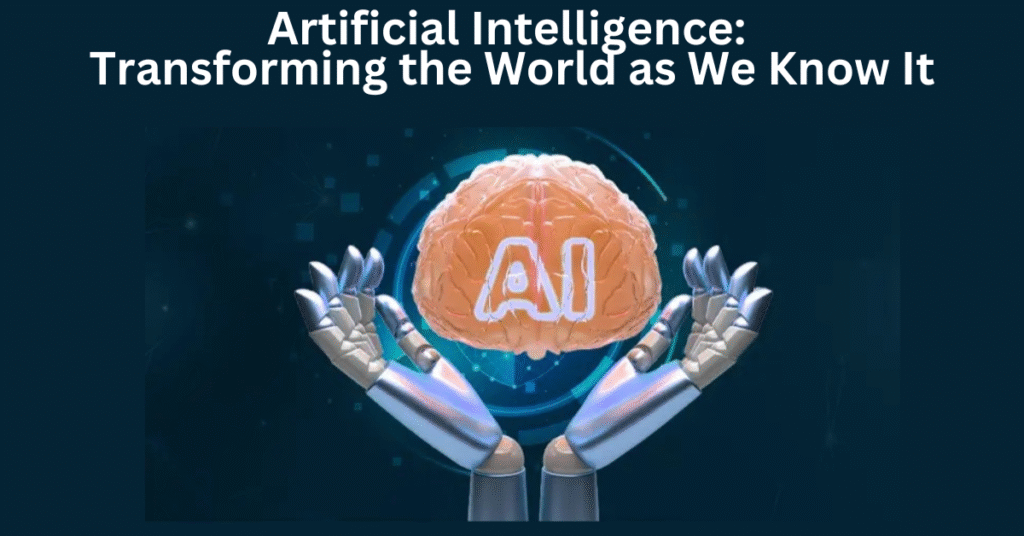Artificial Intelligence (AI) is no longer a futuristic concept confined to science fiction movies. It has become an integral part of our daily lives, revolutionizing industries, reshaping economies, and redefining human potential. From voice assistants in smartphones to autonomous vehicles, AI is everywhere—and its impact is only growing.
In this blog, we’ll explore what AI is, how it works, its types, applications, benefits, challenges, and the future it promises.
What is Artificial Intelligence?
Artificial Intelligence is the branch of computer science that aims to create machines capable of performing tasks that typically require human intelligence. These tasks include:
- Problem-solving
- Learning from experience
- Understanding natural language
- Recognizing patterns
- Making decisions
At its core, AI enables machines to mimic cognitive functions such as reasoning, perception, and decision-making.
How Does AI Work?
AI systems rely on vast amounts of data and algorithms to function. The key components include:
- Data: The foundation of AI. It can be structured (databases, spreadsheets) or unstructured (images, text, videos).
- Algorithms: Step-by-step instructions that enable AI to analyze data and make decisions.
- Machine Learning (ML): A subset of AI where machines learn patterns from data without explicit programming.
- Deep Learning: A more advanced ML technique using neural networks, inspired by the human brain, to process complex data.
- Natural Language Processing (NLP): Enables machines to understand, interpret, and respond to human language.
Types of Artificial Intelligence
AI can be classified into three main categories:
- Narrow AI (Weak AI): Designed to perform a specific task, like chatbots or recommendation systems.
- General AI (Strong AI): Machines with human-level intelligence capable of performing any intellectual task (still largely theoretical).
- Superintelligent AI: AI that surpasses human intelligence (a futuristic concept often debated among experts).
Applications of AI Across Industries
AI is not limited to tech companies—it’s transforming every sector:
- Healthcare: AI assists in diagnostics, personalized treatment, drug discovery, and robotic surgeries.
- Finance: Fraud detection, algorithmic trading, and risk management are powered by AI.
- Retail: Personalized recommendations, inventory management, and chatbots enhance customer experience.
- Manufacturing: AI optimizes production processes, predictive maintenance, and supply chain management.
- Transportation: Autonomous vehicles, traffic prediction, and route optimization rely on AI.
- Education: Personalized learning experiences, automated grading, and smart content creation.
- Entertainment: AI curates content, predicts trends, and even generates music or art.
Benefits of Artificial Intelligence
- Efficiency and Productivity: AI automates repetitive tasks, reducing human error.
- Data-Driven Decisions: AI provides actionable insights from large datasets.
- Personalization: Enhances user experiences by predicting preferences and behaviors.
- Innovation: Drives new products, services, and business models.
- Cost Savings: Reduces operational costs through automation and optimization.
Challenges and Risks of AI
While AI offers tremendous benefits, it also poses significant challenges:
- Job Displacement: Automation may replace certain jobs, requiring workforce reskilling.
- Bias in AI Systems: AI can inherit human biases from data, leading to unfair outcomes.
- Security Threats: AI can be exploited for cyber attacks or deepfake creation.
- Ethical Concerns: Decisions made by AI raise moral and legal questions.
- Dependency: Overreliance on AI may reduce human critical thinking and decision-making.
The Future of AI
The future of AI is both exciting and transformative:
- AI-Driven Healthcare: Real-time monitoring, advanced diagnostics, and predictive medicine.
- Autonomous Mobility: Self-driving cars and drones will reshape logistics and travel.
- Smart Cities: AI-powered infrastructure will optimize energy, traffic, and public services.
- Human-AI Collaboration: AI as a co-pilot, assisting humans rather than replacing them.
- Artificial General Intelligence: A potential leap toward machines that think like humans.
Conclusion
Artificial Intelligence is no longer just a tool—it’s a force reshaping our world. Its ability to analyze massive datasets, make predictions, and automate tasks creates unparalleled opportunities for businesses and individuals alike. However, embracing AI responsibly requires ethical considerations, continuous learning, and adaptation to new technological landscapes.
Whether you are a business leader, a student, or a tech enthusiast, understanding AI is no longer optional—it’s essential.
AI is not just the future—it is the present, transforming the way we live, work, and think.
Credit : ChatGPT https://chatgpt.com/
